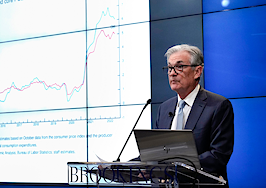Mark your calendars for the ultimate real estate experiences with Inman’s upcoming events! Dive into the future at Connect Miami, immerse in luxury at Luxury Connect, and converge with industry leaders at Inman Connect Las Vegas. Discover more and join the industry’s best at inman.com/events.
Homebuyer demand for mortgages fell for the second week in a row last week as firming rates put a damper on the surge in mortgage applications seen in January, a weekly survey of lenders by the Mortgage Bankers Association (MBA) shows.
The MBA’s Weekly Mortgage Applications Survey showed applications for purchase loans fell by a seasonally adjusted 1 percent last week when compared to the week before and were down 19 percent from a year ago. Requests to refinance were up 12 percent week over week but only 1 percent from a year ago.

Joel Kan
“Mortgage rates have stayed close to where they started the year, despite swings in Treasury yields because of slowing inflation offset by stronger than expected readings on the job market,” MBA Deputy Chief Economist Joel Kan said in a statement.
Mortgage rates no longer falling
At 6.68 percent Tuesday, rates on 30-year fixed-rate conforming mortgages were up 18 basis points from a recent low of 6.50 percent registered on Feb. 1, according to loan lock data collected by Optimal Blue.
That’s still a 1.15 percentage point drop from last year’s peak of 7.83 percent, seen on Oct. 25. However, a record number of Americans polled by Fannie Mae in January — many of whom have been priced out of markets where listings remain scarce — said they’re expecting mortgage rates to come down even more in the year ahead.
“Rates at these levels have not prompted much of a reaction in the refinance market, as most homeowners have mortgages with much lower rates,” Kan said. “Purchase activity has been strong to start 2024 compared to the final quarter of 2023. However, activity is still weaker than a year ago because of low housing supply.”
Applications for purchase mortgages picked up during the first three weeks of January after rates pulled back from 2023 highs. But with mortgage rates now slightly higher than they were at the end of the year, the MBA’s surveys show demand for purchase loans contracting during the weeks ending Jan. 26 and Feb. 2.
Bond market investors’ bets that the Federal Reserve would begin cutting rates in March had been helping bring rates down. But at the central bank’s first meeting of the year, Fed Chairman Jerome Powell warned that a March rate cut was unlikely, and Fed policymakers indicated they intend to continue “quantitative tightening” that’s trimmed $1.3 trillion from the Fed’s balance sheet.
A blowout jobs report released Feb. 2 seemed to validate the Fed’s cautious approach to fighting inflation, showing U.S. businesses and government agencies added close to twice as many jobs as expected in January.
(A survey by the National Federation of Independent Business (NFIB) that’s considered to be a leading indicator of future employment trends points to slower job growth in the second quarter of this year, economists at Pantheon Macroeconomics said Tuesday in a note to clients.)
In an interview with the CBS News program 60 Minutes that aired Sunday, Powell reiterated that while almost all 19 members of the Federal Open Market Committee expect to cut rates this year, the first cut isn’t likely to come until the middle of the year.
Inflation “has been falling steadily for 11 months,” 60 Minutes reporter Scott Pelley pointed out to Powell. “You’ve avoided a recession. Why not cut the rates now?”
Powell said that with the economy still on strong footing, “we feel like we can approach the question of when to begin to reduce interest rates carefully.”
The Fed wants to see “more evidence that inflation is moving sustainably down to 2 percent,” Powell said. “We have some confidence in that. Our confidence is rising. We just want some more confidence before we take that very important step of beginning to cut interest rates.”
At 7.29 percent, rates on jumbo mortgages that exceed Fannie Mae and Freddie Mac’s $766,550 conforming loan limit are up 73 basis points from a recent low of 6.56 percent registered by Optimal Blue on Dec. 29.
The growing “spread” between conforming and jumbo mortgage rates coincides with renewed worries that falling commercial real estate values could lead to problems for regional banks that have traditionally been a leading provider of jumbo loans.
Asked by 60 Minutes about the likelihood of real estate sparking a banking crisis on the magnitude of the 2008 financial crisis, Powell said he doesn’t think that’s likely.
“We’ve looked at the larger banks’ balance sheets, and it appears to be a manageable problem,” Powell said. “There are some smaller and regional banks that have concentrated exposures in these areas that are challenged. And, you know, we’re working with them.”
While he doesn’t see a repeat of the 2008 financial crisis, Powell does expect “there will be some banks that have to be closed or merged out of existence because of this. That’ll be smaller banks, I suspect, for the most part.”
Get Inman’s Mortgage Brief Newsletter delivered right to your inbox. A weekly roundup of all the biggest news in the world of mortgages and closings delivered every Wednesday. Click here to subscribe.












